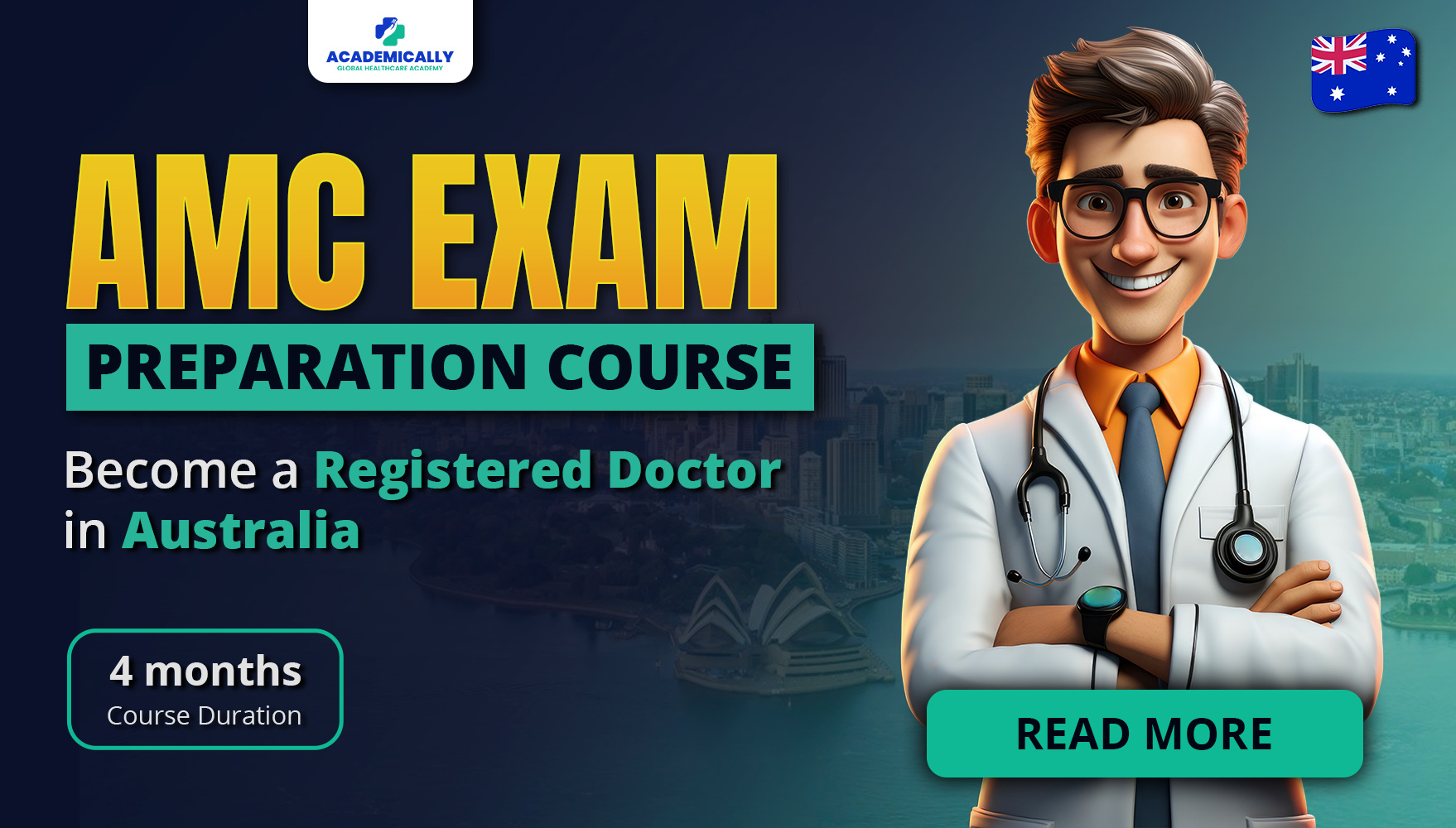What is the AMC Exam?
The AMC exam is the assessment by the Australian Medical Council to assess the skills and knowledge of international medical graduates seeking registration to practise in Australia. The result of this exam will determine if the candidate is fit to practise in the Australian context and adheres to the standards set by the Australian healthcare system.

The AMC exam is divided into two parts.
- Part 1: AMC Written Examination
- Part 2: AMC Clinical Examination
The AMC written examination is a computer-administered test with multiple-choice questions.
AMC Clinical Examination
The AMC clinical examination is designed in such a way that it thoroughly evaluates the clinical competence of the candidate. The standard of performance required for the AMC clinical examination will be as follows.
Understanding Health: Know about common health problems in Australia and how to prevent them. Also, be aware of less common health issues.
Talking with Patients: Be able to have a good conversation with patients to understand their health issues. This includes asking about their symptoms and medical history.
Physical Check-up: Be able to perform a thorough physical examination to check for any signs of illness or health problems.
Figuring out the Problem: Be able to identify what might be wrong with a patient based on their symptoms and examination findings.
Tests and Investigations: Know when to order tests like blood tests or scans and understand the results.
Making a Plan: Be able to come up with a plan to help the patient get better. This might include medications or other treatments.
Understanding Medications: Know what different medications do, how they work, and any side effects they might have.
Explaining the Plan: Be able to explain to the patient why you've chosen a particular treatment and why it's important for them.
Understanding the Elements of AMC Clinical Examination
- History taking
- Physical examination
- Clinical reasoning
- Communication skills
- Professionalism and ethics
Strategies to Master the AMC Clinical Assessment
Familiarise Yourself with the Format: Understanding the structure and expectations of the AMC clinical examination is crucial. Reviewing past exam papers, practice questions, and sample scenarios can help you become familiar with the format and types of cases you may encounter.
Develop Clinical Skills: Practise and refine your clinical skills regularly. This includes history taking, physical examination techniques, clinical reasoning, and communication skills. Utilise clinical practice guidelines and resources to ensure your knowledge is up-to-date and evidence-based.
Simulated Practice: Engage in simulated practice sessions with colleagues, mentors, or professional organisations offering AMC exam preparation courses. Simulated patient encounters can help you simulate real exam conditions and receive constructive feedback on your performance.
Time Management: Time management is critical during the exam. Practise pacing yourself to ensure you allocate sufficient time for each station without rushing or leaving tasks unfinished. Prioritise essential aspects of patient care and decision-making to optimise your time.
Seek Feedback: Actively seek feedback on your performance from peers, mentors, or instructors. Constructive feedback can help you identify areas for improvement and refine your skills accordingly.
Stay Calm and Confident: Maintaining composure and confidence during the exam is essential. Practise relaxation techniques such as deep breathing or visualisation to manage stress and anxiety. Remember to trust in your abilities and preparation.
Review AMC Resources: Utilise AMC-recommended resources and study materials to supplement your preparation. These may include textbooks, online courses, clinical guidelines, and practice exams specifically tailored to the AMC clinical examination.
Ethics and Professionalism: Dedicate time to understanding medical ethics, professionalism, and legal obligations in clinical practice. Familiarise yourself with relevant guidelines and regulations governing healthcare in Australia.
Continuous Learning: Keep abreast of developments in the medical field and continue to expand your knowledge beyond the exam requirements. Attend conferences, workshops, and seminars to stay informed about emerging trends and best practices in medicine.
Practise Consistently: Finally, consistent and dedicated practice is key to mastering the AMC clinical examination. Set aside regular study sessions, mock exams, and practice scenarios to refine your skills and build confidence over time.
The Australian Medical Council recommends three things while preparing for the AMC clinical examination.
- Understanding the clinical examination specifications
- Watching the candidate briefing video
- Reviewing the suggested reading list for the clinical examination
Conclusion
Mastering the AMC clinical examination requires a combination of clinical competence, effective communication skills, and professional conduct. By understanding the exam format, honing your clinical skills, seeking feedback, and staying composed under pressure, you can increase your chances of success. Remember that preparation is key, so invest time and effort into your studies and practice consistently to achieve your goals. With determination and dedication, you can overcome the challenges of the AMC clinical examination and embark on a rewarding medical career in Australia.
Fill up this form for a free one on one counselling session.



